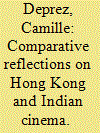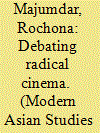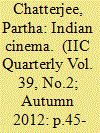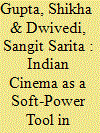| Srl | Item |
| 1 |
ID:
091023


|
|
|
|
|
| Publication |
2009.
|
| Summary/Abstract |
Much research on contemporary Asian cinema is focused within national boundaries or takes an outright international approach, with few comparative studies. Historic and cinematographic similarities between Hong kong and India since the 1980s allow for a consideration of identity deconstruction and reconstruction in diaspora as seen in some of their films.The notion of vagueness becomes crucial to a nuanced view of the tendency either to withdraw into one's community or turn cosmopolitan.
|
|
|
|
|
|
|
|
|
|
|
|
|
|
|
|
| 2 |
ID:
112484


|
|
|
|
|
| Publication |
2012.
|
| Summary/Abstract |
This paper offers a history of the creation and development of film societies in India from 1947 to 1980. Members of the film society movement consisted of important Indian film directors such as Satyajit Ray, Ritwik Ghatak, Shyam Benegal, Basu Chatterji, Mani Kaul, G. Aravindan, Kumar Shahani, Adoor Gopalkrishnan, and Mrinal Sen, as well as film enthusiasts, numbering about 100,000 by 1980. The movement, confined though it was to members who considered themselves film aficionados, was propelled by debates similar to those that animated left-oriented cultural movements which originated in late colonial India, namely, the Progressive Writers Association in 1936, and the Indian People's Theatre Association in 1942. By looking at the film society movement as an early and sustained attempt at civil-social organization in postcolonial India, this paper highlights the two distinct definitions of 'good cinema'-from an aesthetically sophisticated product to a radical political text-that were debated during the time of the movement.
|
|
|
|
|
|
|
|
|
|
|
|
|
|
|
|
| 3 |
ID:
129014


|
|
|
| 4 |
ID:
186737


|
|
|
|
|
| Summary/Abstract |
The focus on soft power, particularly cultural diplomacy with special reference to Indian cinema, and its usage in foreign policy, has noticeably increased in recent years. As a matter of fact, the most prominent and increasingly visible player is India’s Hindi film industry, popularly described as Bollywood. The paper intends to focus on engagement of India’s soft power in Africa by applying Nye’s concept of soft power. The account argues that the growth of desirability for its culture opens up possibilities for India to realize foreign policy goals.
|
|
|
|
|
|
|
|
|
|
|
|
|
|
|
|